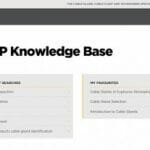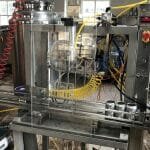Polypipe Building Services are leveraging the additional benefits offered by Stäubli’s QMC122 range of magnetic platens to further improve productivity levels in the manufacture of the company’s injection moulded plastic waste fittings.
Productivity in any manufacturing business is an essential element in both satisfying customer demand and achieving profitability targets, therefore every opportunity to improve productivity and efficiencies should be fully evaluated.
Within the plastics injection moulding sector, a key element in attaining target productivity levels is reducing the time required to change mould tools. The traditional method requires multiple bolts to be undone and clamps removed to release the mould tool from the platens. These bolts and clamps then have to be replaced and correctly re-tightened to secure the new tool in place. The logistics surrounding this process requires all of the equipment and hand tools needed to perform these operations to be in place if mould change times are to be kept to a minimum.
With mould tools weighing anything between 500kg and 5 tonnes, it is also essential that any new tools are correctly secured to the machine platens, as any slippage could not only result in machine damage but trigger significant safety issues for the maintenance teams and the operators.
The Attraction Of Magnetic Platens
Magnetic platens offer a quicker and simpler solution to mould tool changes and the Polypipe Building Services site in Aylesford Kent has experience of using this technology as explained by Steve Tulett – Polypipe Building Services Manufacturing Innovation Manager: “We adopted magnetic platen technology some time ago and quickly realised the benefits in terms of simpler and faster tool changes, saving on average around 30 minutes each time. However, we continually review the technologies available to us to ensure that we can take advantage of any new developments. We identified Stäubli’s QMC122 Range of magnetic platens as a solution which provides a number of additional benefits such as greater levels of feedback from the interface, which for example allows us to obtain an exact measurement of the clamping force when we install the new tools.”
Stäubli’s QMC solution integrates a wide range of features which enable anticipation of possible malfunctions. These include an interactive control panel which enables the validation of the safety points during mould changing operations. Also, the system accurately controls clamping force in real time, and the operator is alerted if there is insufficient force exerted on the mould tool. Stäubli’s IMAG-Editor software enables the clamping force for each mould tool to be calculated beforehand, depending upon the press within which it will be used. Signal data from the injection moulding machine is handled and displayed by the IMAG safety interface which is compliant with EUROMAP 70 and SPI AN-145.
Stäubli’s QMC 122 Range is currently being used by Polypipe Building Services on a 150T Demag Ergotech Machine and a new Haitian 160T machine, with other installations planned to follow.
The recent adoption of Stäubli’s QMC122 Range has initiated further discussions on the complete range of Injection Moulding Related technologies available from Stäubli and the benefits they can bring to Polypipe Building Services, as explained by Steve Tulett. “We are now looking closely at a number of options available from Stäubli, including their RMI Multi Plate technology, which could contribute to reducing tool change times and further improve efficiencies. In addition, the new range of MPS robotic tool change systems recently launched are also of interest as we can see the benefits of consistency in quality and performance across a complete range of inter-related products available from a single source.”





